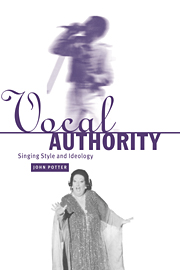Book contents
- Frontmatter
- Contents
- Preface
- Acknowledgements
- Chapter 1 Classical ideology and the pre-history of singing
- Chapter 2 The medieval period: religion, literacy and control
- Chapter 3 The Italian baroque revolution
- Chapter 4 The development of the modern voice
- Chapter 5 Concerts, choirs and music halls
- Chapter 6 Armstrong to Sinatra: swing and sub–text
- Chapter 7 Early music and the avant-garde: twentieth-century fragmentation
- Chapter 8 Elvis Presley to rap: moments of change since the forties
- Chapter 9 Singing and social processes
- Chapter 10 Towards a theory of vocal style
- Notes
- List of references
- Index
Chapter 9 - Singing and social processes
Published online by Cambridge University Press: 22 September 2009
- Frontmatter
- Contents
- Preface
- Acknowledgements
- Chapter 1 Classical ideology and the pre-history of singing
- Chapter 2 The medieval period: religion, literacy and control
- Chapter 3 The Italian baroque revolution
- Chapter 4 The development of the modern voice
- Chapter 5 Concerts, choirs and music halls
- Chapter 6 Armstrong to Sinatra: swing and sub–text
- Chapter 7 Early music and the avant-garde: twentieth-century fragmentation
- Chapter 8 Elvis Presley to rap: moments of change since the forties
- Chapter 9 Singing and social processes
- Chapter 10 Towards a theory of vocal style
- Notes
- List of references
- Index
Summary
The previous chapters have explored how relationships change and evolve between and within vocal styles. The dominance of one style over others is articulated not just on a macro level by stylistic development, however, but is also created by social processes that operate within and between varieties. The way in which singers create meaning, an essential marker of vocal style in any variety, depends on the complex interaction of the many factors that go to make up performance rhetoric. The articulation of language through rhetoric is at the very heart of singing, and this chapter examines in some detail how language works in performance. The channels through which rhetoric is realised include technique, technology, gesture and semiotics, dress codes and the expression of sexuality, and the authority of a particular style is derived in no small degree from the way these extra-musical factors mesh together. The chapter concludes with a brief case study of the phenomenon known as ‘cross-over’, which illuminates many of the points made in the chapter.
Two striking facts emerge from the study of the literature of music in performance. In the classical field there is almost no performance analysis, apart from journalistic criticism in the form of reviews and the attempts to investigate historical performance practice. Mainstream musicological attention has been focused almost exclusively on the written form of the music.
- Type
- Chapter
- Information
- Vocal AuthoritySinging Style and Ideology, pp. 158 - 189Publisher: Cambridge University PressPrint publication year: 1998



